
Gjurgjica Panova
Updated on: January 10, 2024
Only 4 Steps (Quick + Easy) to Set Up a VPN on Oculus Quest in 2024
- 1. Get a fast VPN. I recommend ExpressVPN, as it has the fastest speeds on the market and strong security features.
- 2. Enable Developer Mode on your Oculus account. You’ll need to register a developer and create an organization first. Then, navigate to Settings on your Oculus to enable developer mode.
- 3. Download and install SideQuest. This app lets you browse apps and games for your Oculus Quest device.
- 4. Download and install your VPN’s APK. Log into your VPN account and connect to a server.
I always recommend using a VPN with Oculus Quest. A VPN encrypts your online connections on Oculus Quest, making it hard for anyone to track your activities or infiltrate your device, and stops ISP throttling. Plus, VPNs change your location by allowing you to connect to one of its servers around the world — this means you’ll be able to play games in different regions and try games you may not be able to access in your current location.
Installing a VPN on Oculus Quest is a bit tricky because the device doesn’t natively support VPNs, so you won’t be able to just download your VPN to the device as you would on your PC or smartphone. But if you follow the right directions, the process of setting up a VPN on Oculus Quest is mostly hassle-free.
I’ve created this guide to show you how to easily set up a VPN on Oculus Quest and how to troubleshoot the most common issues. Additionally, I listed the best VPNs for Oculus Quest. My top pick is ExpressVPN because it has industry-leading speeds and excellent security features.
TRY EXPRESSVPN FOR OCULUS QUEST NOW
Best VPNs for Oculus Quest in 2024
- 🥇1. ExpressVPN — Best overall VPN for Oculus Quest in 2024 with lightning-fast speeds and strong security.
- 🥈2. Private Internet Access — High-end security features for keeping you safe and anonymous while using Oculus Quest.
- 🥉3. CyberGhost VPN — Good VPN with dedicated servers for streaming and gaming on Oculus Quest lag-free.
🥇1. ExpressVPN — Best VPN for Oculus Quest in 2024
ExpressVPN is the best VPN for Oculus Quest — it has top-notch security features, maintains the fastest speeds in the industry, offers user-friendly apps, including a native router app, and provides excellent streaming support.
I had super-fast speeds with ExpressVPN thanks to its proprietary Lightway protocol. In my tests, all sites and HD videos loaded instantly, I had really low ping, and I was able to play games without any lag.
ExpressVPN is very secure. It comes with:
- Anti-DDoS protection. All of ExpressVPN’s servers include anti-DDos protection, so if a sore loser tries to DDoS the VPN server, they’ll fail.
- Full leak protection. ExpressVPN has DNS, WebRTC, and IPv6 leak protection, which means your real IP address and location will remain anonymous for all online activities on your Oculus Quest device. I ran 10+ leak tests with ExpressVPN, and I never experienced any leaks.
- Threat Manager. It prevents ad trackers from spying on your browsing on Oculus Quest and blocks malicious sites.
- RAM-only servers. ExpressVPN doesn’t store any data on the hard drive and deletes all data with every server reboot.
- An audited no-logs policy. ExpressVPN’s no-logs policy has been independently audited and confirmed multiple times.
- Perfect forward secrecy. This security feature changes the encryption key for each session, minimizing the amount of data potential hackers could access.
Plus, it’s one of the only VPNs on the market that comes with a dedicated router app, which is very easy to install — it took me about 10 minutes to set it up on my router. Once I configured the VPN on my router, any device connected to my router was also connected to the VPN. ExpressVPN also sells its own router, called Aircove, which comes with built-in VPN protections.
ExpressVPN is my favorite VPN for streaming. It reliably works with 100+ streaming platforms, including Netflix (10+ content libraries), Hulu, and Amazon Prime Video — it’s why we’ve ranked it our #1 VPN for streaming.
Also, I love how ExpressVPN supports cloud gaming like Xbox Cloud Gaming. This way, you don’t even need to use an Xbox console.
ExpressVPN has several plans starting at $6.67 / month. All plans have a 30-day money-back guarantee.
Read our full ExpressVPN review
🥈2. Private Internet Access — Great Security Features
Private Internet Access (PIA) has advanced security and privacy features that protect all of your online activities on Oculus Quest. These include full leak protection (DNS, WebRTC, and IPv6 leaks), RAM-only servers, perfect forward secrecy, and an audited no-logs policy. It is also anti-DDoS protection for uninterrupted gaming on your Oculus Quest.
I’m a big fan of PIA MACE, which is the best ad blocker on the market. In my tests, it blocked all ads on every site I visited and all shady HTTPS sites, so it keeps you safe from malicious ads and sites when browsing on your Oculus Quest set.
PIA had fast speeds in my tests. Sites and HD videos loaded immediately, and I was able to play games with minor interruptions. That said, PIA is slower than ExpressVPN.
I really like that PIA works with 30+ popular streaming sites like Netflix, Hulu, and Max. It also has dedicated streaming servers in 5+ countries — the US, the UK, Japan, Italy, Sweden, Finland, and Denmark.
PIA offers manual router support (unlike ExpressVPN, which has a router app). The good news is it works with top router firmware, such as AsusWRT and DD-WRT, and it provides helpful configuration guides that are pretty easy to follow.
I think it’s great that all PIA apps are set to recommend default settings, so you don’t have to worry about configuring them. But they are also very customizable, as you can change encryption levels (128-bit AES or 256-bit AES) and proxy settings to get faster and more stable connections on Oculus Quest.
Private Internet Access offers pretty cheap plans that start at $2.11 / month. All plans are backed by a 30-day money-back guarantee.
Read our full Private Internet Access review
🥉3. CyberGhost VPN — Dedicated Servers for Streaming and Gaming
CyberGhost VPN has dedicated streaming and gaming servers, which are optimized to work with specific streaming services and provide low ping for the fastest speeds while gaming.
It has 100+ streaming servers for 50+ streaming apps like Netflix and Amazon Prime Video, and BBC iPlayer. Meanwhile, CyberGhost offers 70+ dedicated gaming servers in the US, the UK, Germany, and France.
This VPN provider had pretty fast speeds in my tests. It took 1–2 seconds to load sites and HD videos, and although I had some lag in my online games, it didn’t really affect their quality. Still, CyberGhost doesn’t match ExpressVPN’s speeds.
I like that CyberGhost has advanced security features, like RAM-only servers, perfect forward secrecy, and an audited no-logs policy. Plus, all of its servers have anti-DDoS protection. While it works with many different routers, CyberGhost doesn’t have a native router app, like ExpressVPN.
I’m a fan of CyberGhost’s Smart Rules feature. It allows you to customize your connection preferences — for example, you can set up CyberGhost to automatically connect to a server when it detects an unsecured Wi-Fi network or to connect to the fastest server as soon as you launch the app.
CyberGhost VPN’s plans start at $2.03 / month. The long-term plans have a 45-day money-back guarantee, and the monthly plans have a 14-day money-back guarantee.
Read our full CyberGhost VPN review
Comparison of the Best VPNs for Oculus Quest in 2024
How to Choose the Best VPN for Oculus Quest in 2024
- Look for a VPN that works with Oculus Quest. Oculus Quest doesn’t natively support VPNs, so you either need to sideload the VPN on the device, configure it on your router, or share a VPN connection from your PC. Every VPN on my list has an APK file you can download on Oculus Quest and good router support.
- Consider speed. All VPNs slow down your speeds, as it takes time to encrypt your traffic and send it through one of its servers. With the best VPNs, you won’t notice any latency. In my tests, ExpressVPN had the fastest speeds.
- Check the server network. A large server network means you’ll get the fastest possible speeds no matter where you are in the world. It also makes it more likely that there’ll be a server in your home country to access local games and watch streaming services’ libraries.
- Find a VPN with strong security features. All the VPNs on this list come with industry-standard features, like 256-bit AES encryption, a kill switch that disconnects you from the internet if your VPN connection fails to prevent traffic leaks, a no-logs policy, and anti-DDoS protection.
- Get a VPN that provides good value. I only recommend VPNs that offer affordable plans with a generous money-back guarantee and multiple simultaneous connections.
What Are the Benefits of Installing a VPN on Oculus Quest?
- Secure browsing. A VPN encrypts all internet traffic on your Oculus Quest, making it unreadable. This means your internet service provider (ISP) or any other third party can’t monitor your browsing, who you’re chatting with on social media, or how much time you spend playing games.
- Safe gaming. Many VPNs come with anti-DDoS (Distributed Denial of Service) protection, preventing other gamers from either causing network slowdowns or even knocking you offline.
- Access to local games and streaming services. A VPN hides your IP address and assigns you a new one that matches the location of the server you’re connected to. If you travel abroad, you can connect to a server in your home country to access region-locked games on Oculus Quest. Though it’s theoretically possible to do the same with streaming services, it may be considered copyright infringement and we don’t recommend it.
- Avoid bandwidth throttling. ISPs slow down your internet connection if they detect heavy data consumption, which typically happens during streaming HD and 4K videos and gaming. A VPN encrypts all traffic on your Oculus Quest, so ISPs won’t reduce your connection speeds based on your online activities.
- Public Wi-Fi protection. Public Wi-Fi networks, like at cafes and hotels, aren’t secure, leaving your data potentially exposed. Since a VPN encrypts all of your traffic, anyone trying to access it will only see undecipherable information.
- Reduced lag and latency. A VPN can optimize your gaming speeds in online multiplayer VR games by connecting your Oculus Quest to a more direct gaming server.
How to Install a VPN on Oculus Quest (Step-By-Step Guides)
There are a few ways to set up a VPN on Oculus Quest, including sideloading the VPN app on your Oculus Quest, sharing a VPN connection from your PC, and configuring the VPN to your router to secure. I’ve created detailed step-by-step guides for all of these here:
Download an APK file
- Create an Oculus developer account. Click on this link https://developer.oculus.com/sign-up/ and create a username and password. There are also options to log in with your Facebook or Instagram account.

- Create an organization in your developer account. Open the Select Organization menu and then select Create. Name your organization and select Submit. Go over the Developer Non-Disclosure Agreement, press I Agree, and then click Submit.
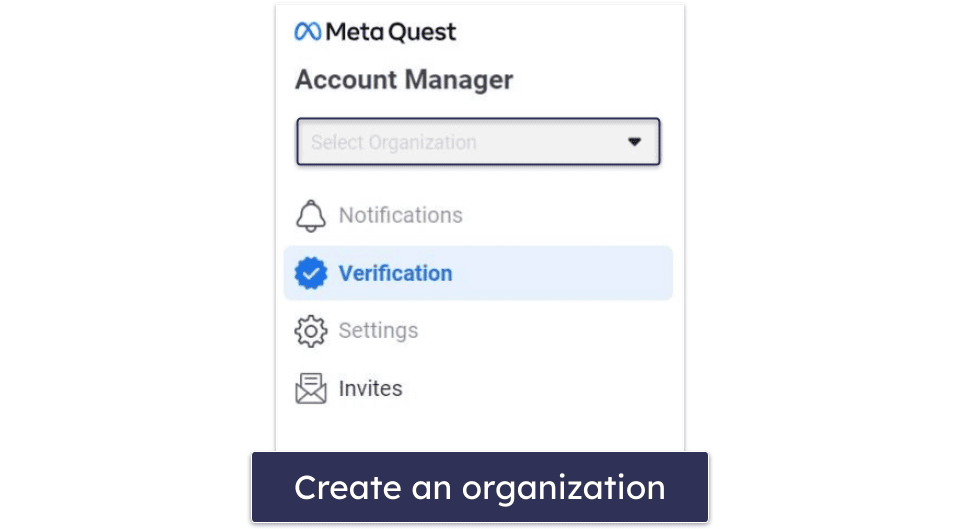
- Enable developer mode. On your headset, go to Settings > System > Developer, and turn on the USB Connection Dialog option. Alternatively, launch the Meta Quest Mobile App, select the headset from the list, and then toggle the Developer Mode option on.
- Download and install SideQuest on your PC. SideQuest is an app that offers a curated selection of user-generated and independent virtual reality content to sideload on your Oculus Quest.
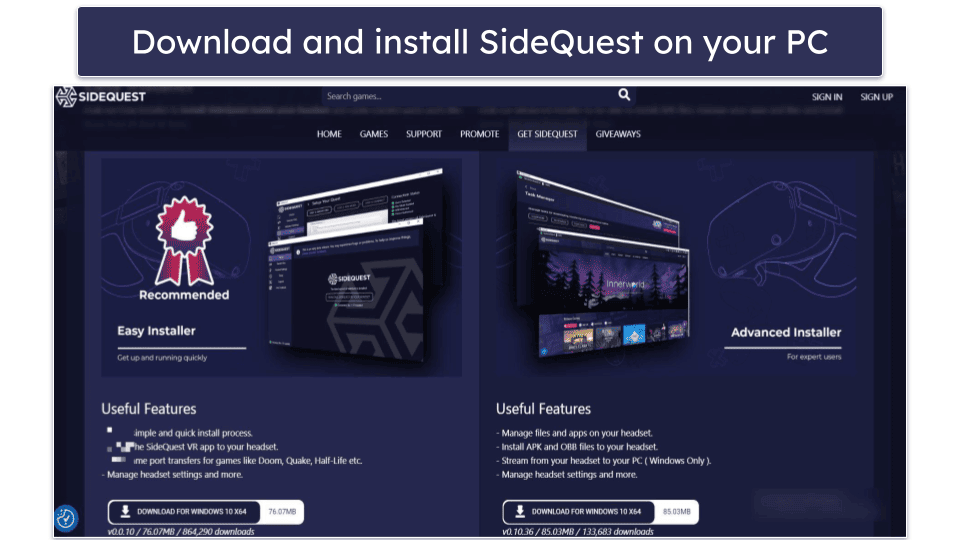
- Connect Oculus Quest to your PC with a USB. Load SideQuest on your PC, then choose Connect Device. Next, choose Allow USB Debugging, and click on Always Allow (USB debugging) from this Computer.
- Download the VPN APK file. You should be able to find it on your VPN provider’s site, but if you can’t, reach out to their customer support, and they’ll send you a link.
- Next, load SideQuest and choose Repos. Drag the VPN’s APK and drop it in Repos Window. If you’re downloading ExpressVPN, you have 2 options: download the ExpressVPN Android app or the APK file.
- Connect to the VPN. Turn on your Oculus device, and navigate to Home Screen. Choose Library > Unknown Sources. From the VPN’s APK file, connect to a server.
Use a Physical Router
- Check if your router supports VPNs — even VPNs that support routers only work with some routers. To make sure a VPN works with your router, go to their official website or reach out to their live chat reps. I recommend ExpressVPN, as it has its own router app that’s compatible with many routers.
- Find your VPN’s instructions for your router. The step-by-step instruction for every router is different. The VPNs I recommend offer detailed tutorials for each router they support on their website that include screenshots. The easiest to set up was ExpressVPN — it only took me about 10 minutes to configure the router app on my router.
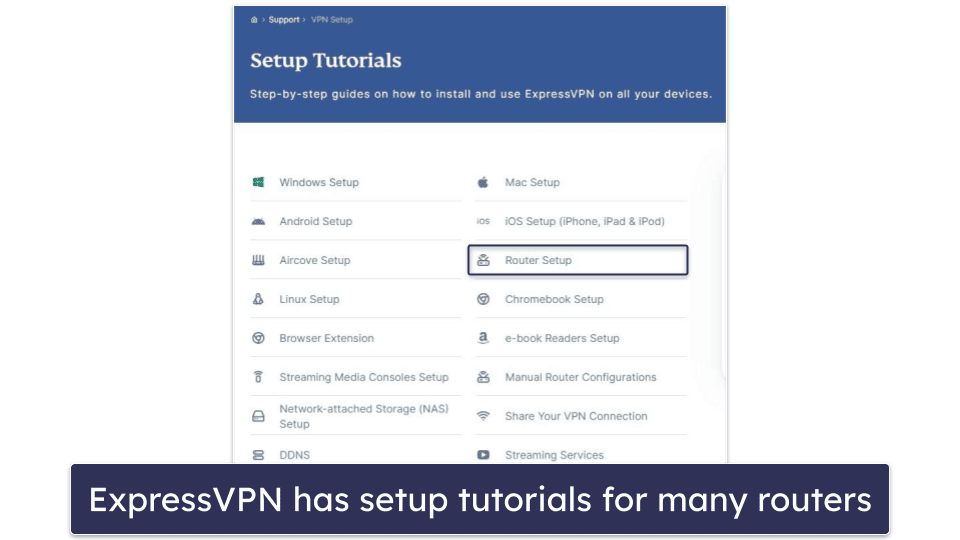
- Follow the instructions in your VPN’s guide. For most routers, you’ll need to get the OpenVPN details and configuration files from your VPN’s setup page. Then, upload the OpenVPN file in your router’s VPN client section.
- Disconnect your Oculus Quest from your router and reconnect it again. That’s it! Now your Oculus Quest device is connected to the VPN.
Use a Virtual Router
Windows 10
- Navigate to Network & Internet settings on your Windows device. Right-click on the Wi-Fi connection icon on your Windows toolbar and select Open Network & Internet Settings.

- Click on the Mobile Hotspot tab, which is located on the left-hand side, and toggle the Share my Internet connection with other devices setting to on.
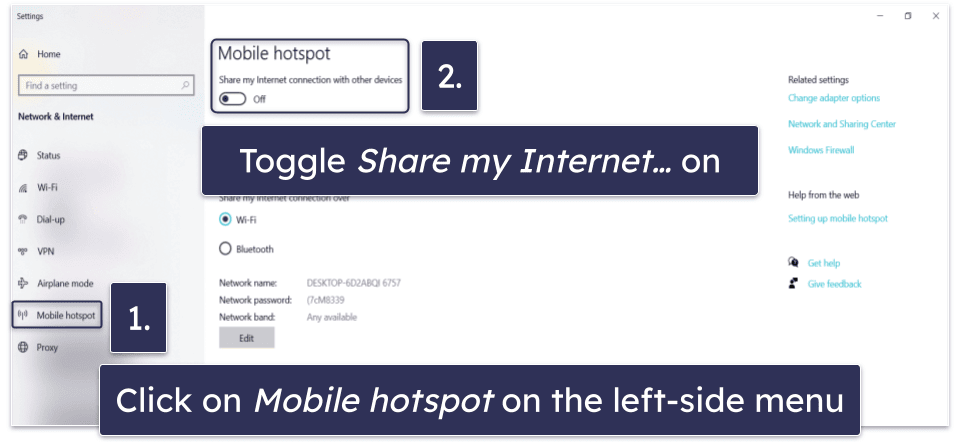
- Go to Change adapter options. It’s located on the right-hand side under Related settings.
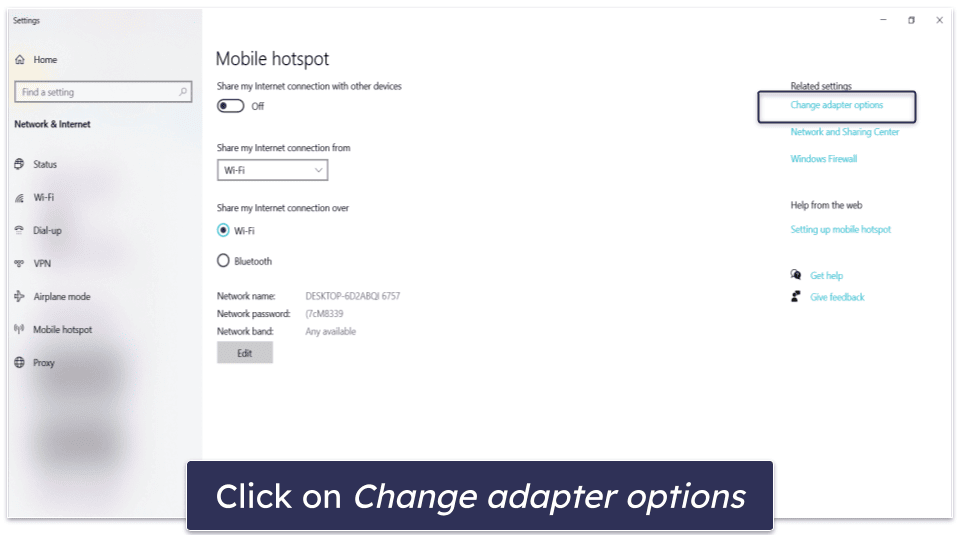
- Look for the VPN adapter. In my case, it’s labeled as TAP-ExpressVPN Windows Adapter. Right-click on it and select Properties in the drop-down menu.
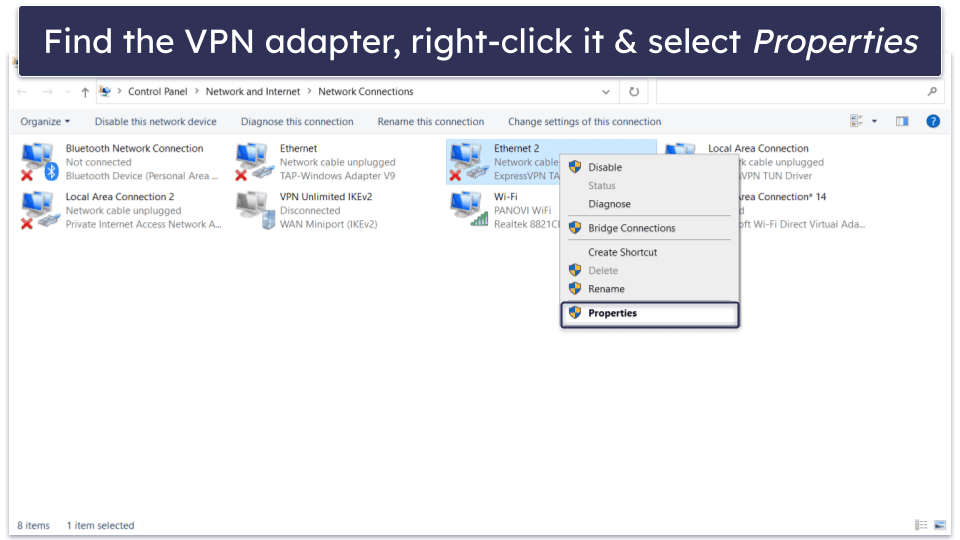
- In the new window, click on the Sharing tab and check the box next to Allow other network users to connect through this computer’s Internet connection.
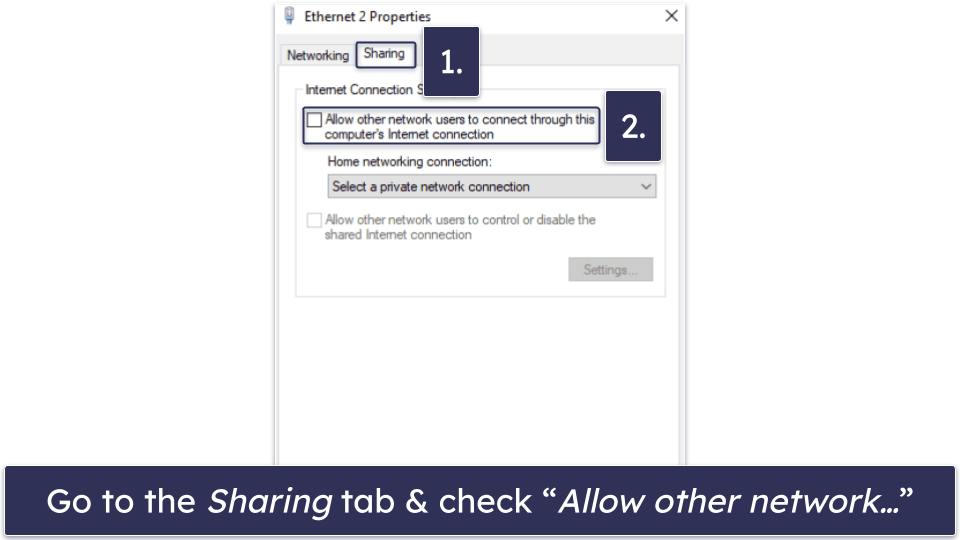
- Connect to a VPN server on your Windows device. Then, connect your Oculus Quest headset to your new Wi-Fi network.
macOS
- Connect your macOS device to your router with an ethernet cable. If your Mac doesn’t have an ethernet port, you’ll need a USB adapter.
- Click on System Preferences in the Apple menu. Open the menu by clicking on the Apple icon located in the top left corner of your screen.
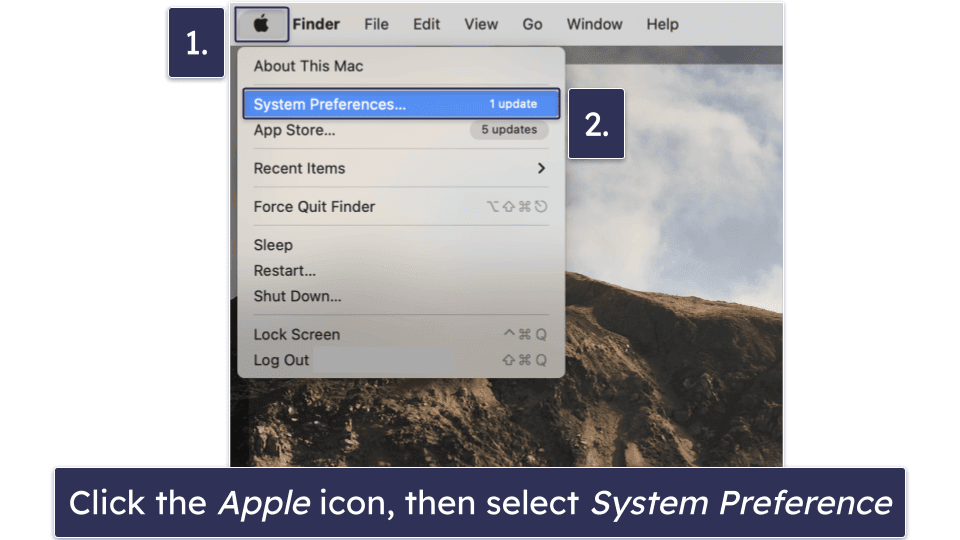
- Click on Sharing. It’s located at the bottom.
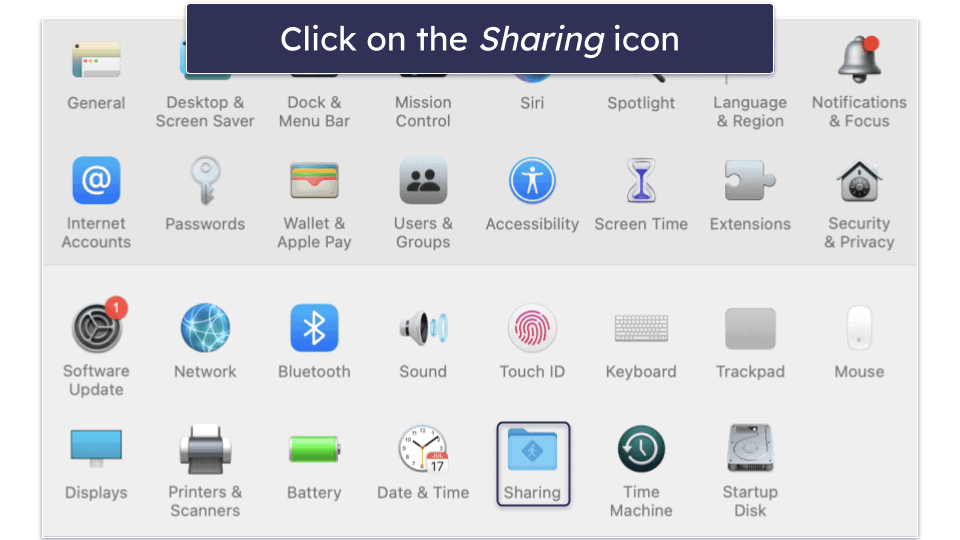
- Navigate to Internet Sharing. In the drop-down menu, choose the port that the ethernet cable is plugged in. Then check the Wi-Fi box in the To computers using section.
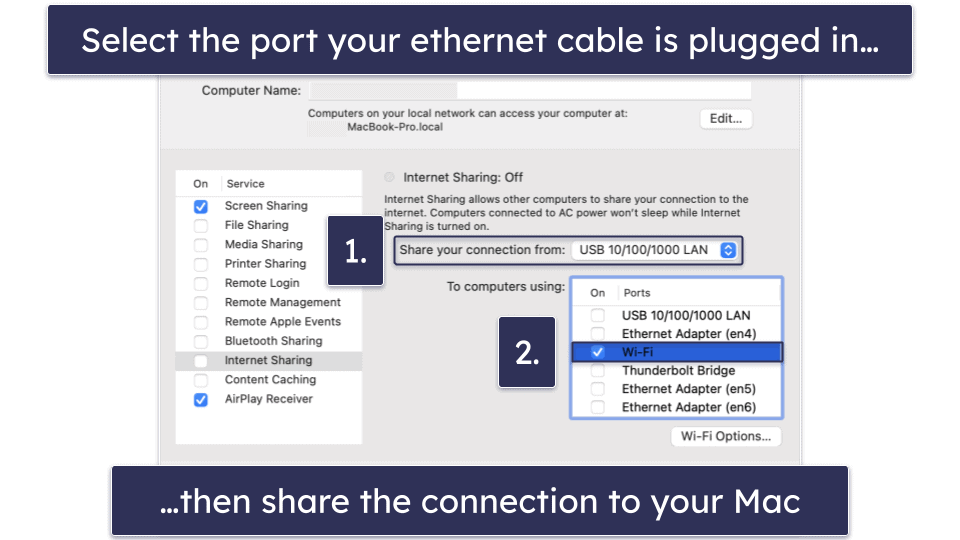
- Check the box next to Internet Sharing.
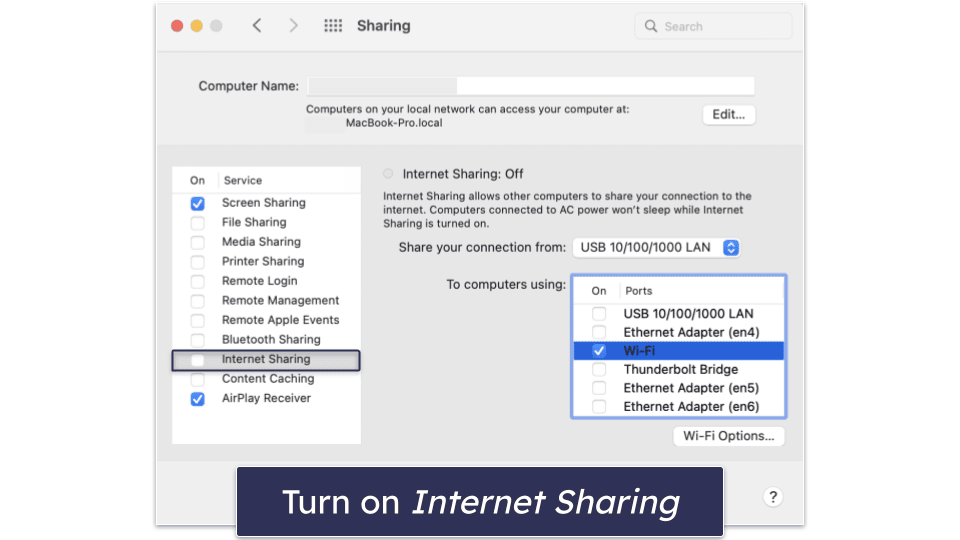
- Configure your network. Name your network and set a password.
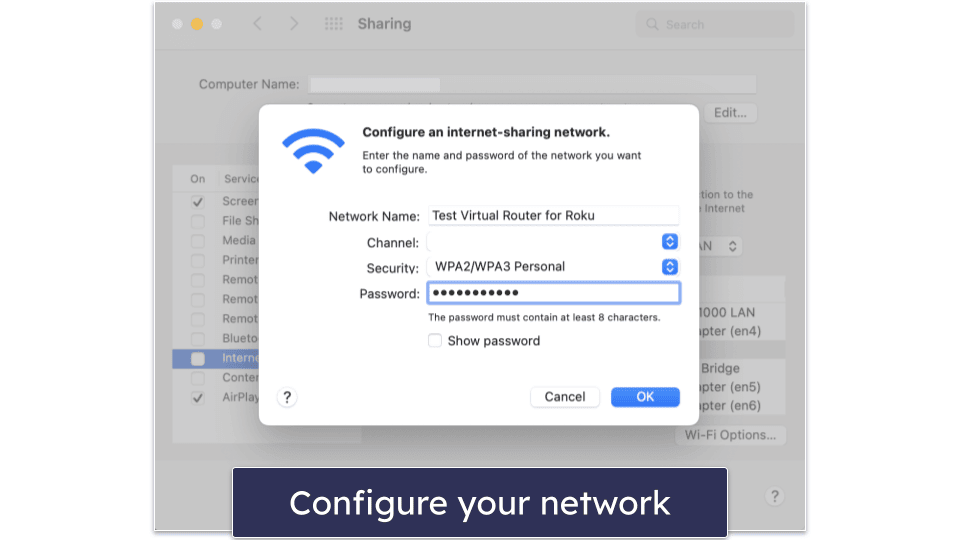
- Turn on Internet Sharing by clicking Start.
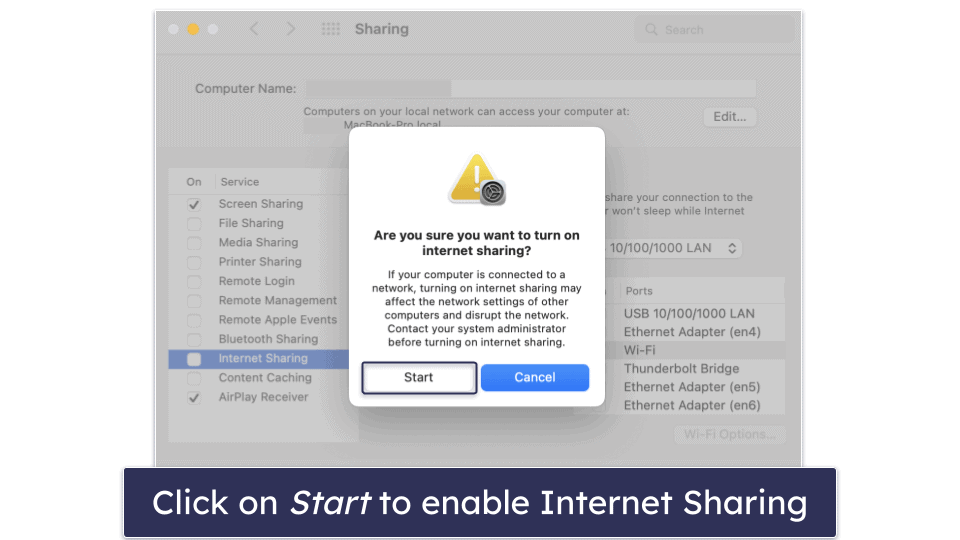
- Open the VPN app and connect to a server. Finally, connect your Oculus Quest device to your new Wi-Fi network.
Tried Installing a VPN on Oculus Quest, But It’s Not Working? Try These Troubleshooting Steps
Check Internet Connection
If your connection is weak, the VPN won’t be able to maintain a steady connection to the VPN server, which will cause it to frequently disconnect. If that’s what’s causing your connection issues, try moving closer to the Wi-Fi router or getting a Wi-Fi range extender.
Reinstall the VPN App
Making changes to application settings might result in connectivity problems. Reinstalling the VPN application will revert all settings to their default states and refresh the app’s permissions.
To uninstall the VPN app, navigate to Settings and select Applications. Choose Manage Installed Applications, locate your VPN app on the list, and select Uninstall. Then, reinstall the app on your Oculus Quest.
Try a Different Server
The server you’re trying to connect to might be down, overcrowded, or experiencing technical difficulties. If that’s the case, connecting to a different server will solve your connection issues. I recommend first trying a server in the same location, but if there isn’t one, you should try a nearby server to get the fastest speeds.
Clear the VPN App Cache
Clearing the cache of the VPN application eliminates corrupted data which may be affecting your VPN’s ability to connect to a server.
To clear the cache of the VPN app, access Settings and click on Applications. From there choose Manage Installed Applications, locate your VPN app, and select Clear Cache.
Contact the VPN Customer Support
The VPN’s support team can help you figure out what’s causing your connectivity issues and solve any technical or account-related issues. The VPNs I recommend all come with live chat and email support.
Frequently Asked Questions
Can I install a VPN directly on my Oculus Quest?
No, the Oculus Quest device doesn’t have a built-in VPN client. If you want to benefit from a VPN connection on your Oculus Quest device, you’ll need to sideload the VPN app (by downloading the APK file through SideQuest). Alternatively, you can configure the VPN on your router or share your VPN connection from your PC.
Can I use any VPN provider for Oculus Quest?
Not really. While not every VPN provider is compatible with Oculus Quest, it’s possible to use most of them by sharing your VPN connection through your PC. If this workaround is too much trouble, you’ll need to find a VPN that allows sideloading on the Oculus Quest via an APK file, or one that supports router configuration, such as ExpressVPN.
Does installing a VPN on Oculus Quest affect performance?
VPNs affect your internet speed because they encrypt your traffic and route it through one of their servers. However, with a good VPN, the impact on your speed is minimal, and you’ll barely notice it, especially if you connect to a nearby server.
Can I install a VPN on Oculus Quest 2 the same way as Oculus Quest?
Yes, the process of setting up a VPN on Oculus Quest 2 is the same as on the original Oculus Quest. This involves either configuring the VPN through your router, sideloading the VPN app on your Oculus Quest device, or sharing the VPN connection from your computer.




